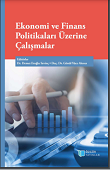Sabit Etkiler Modeli ve Panel Kantil Regresyon Karşılaştırması: BRICS-T Ülkelerinde Ekonomik Büyüme Üzerinde Yenilenebilir Enerji Tüketimi Etkisinin İncelenmesi
Comparison of Fixed Effects Model and Panel Quantile Regression: Investigation of the Effect of Renewable Energy Consumption on Economic Growth in BRICS-T Countries
Author(s): Hayriye Esra Akyüz
Subject(s): Energy and Environmental Studies, Environmental and Energy policy, Economic development
Published by: Özgür Yayın Dağıtım Ltd. Şti.
Keywords: Energy Consumption; Economic Growth; BRICS-T Countries;
Summary/Abstract: In this study, it is aimed to examine and model the effect of renewable energy consumption (% of total final energy consumption) with the inflation rate and population growth on economic growth in BRICS-T countries between 1990-2021. For this purpose; two-way fixed effects model, which includes unit and time effects, which cannot be observed but are characterized as constant, was used. The parameter estimates of the panel quantile regression model and two-way fixed effects model were compared in order to reveal in detail the relationship between the quantiles of the distribution of economic growth in BRICS-T countries and renewable energy consumption, inflation rate, and population growth. According to the results; it has been obtained that there are heteroskedasticity and first-order autocorrelation problems in the fixed effects model. When the results based on the Driscoll-Kraay standard error estimation method were examined, it was determined that the rate of independent variables to explain GDP per capita was approximately 73%. While other variables are constant, a statistically significant negative correlation was obtained between renewable energy consumption, inflation rate, population growth, and GDP per capita in BRICS-T countries. On the other hand, it was determined that the closest results to the Driscoll-Kraay robust estimation results were observed at 0.25 quantiles, where GDP per capita was low. Also; in the 0.50 - 0.75 quantile values, while the effect of population growth on GDP per capita was not statistically significant, it was found to be significant when estimated with robust standard errors.
Book: Ekonomi ve Finans Politikaları Üzerine Çalışmalar
- Page Range: 59-83
- Page Count: 25
- Publication Year: 2023
- Language: Turkish
- Content File-PDF

